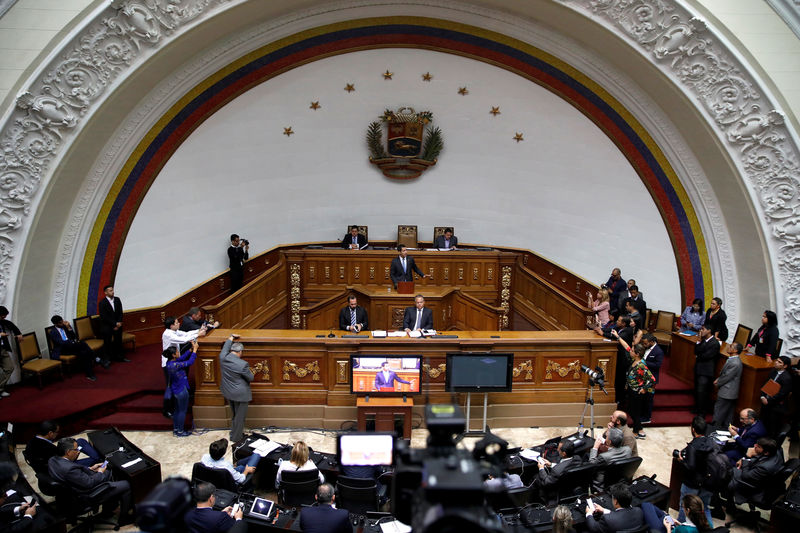By Shaylim Valderrama and Anggy Polanco
CARACAS/SAN CRISTOBAL, Venezuela (Reuters) - Much of Venezuela, including parts of the capital Caracas, remained without power on Monday for a fifth day, crimping vital oil exports and leaving people struggling to obtain water and food.
President Nicolas Maduro, who has blamed the unprecedented blackout on sabotage by the United States at Venezuela's Guri hydroelectric dam, ordered the suspension of classes and the working day, as he had on Friday.
Sources in the oil sector, OPEC member Venezuela's main source of foreign earnings and a vital generator of revenue for Maduro's government, said that exports from the primary port of Jose had been halted by the blackouts.
The opposition-controlled congress called an emergency session to discuss the power cuts, blaming negligence by Maduro's socialist government.
Maduro's rule is being challenged by congress leader Juan Guaido, who in January invoked the constitution to assume the presidency after declaring Maduro's 2018 re-election a fraud. Guaido has been recognized as Venezuela's legitimate leader by the United States and most Western countries, but Maduro retains control of the armed forces and state institutions.
The blackout, which began Thursday afternoon, has heightened frustration among Venezuelans already suffering widespread food and medicine shortages, as the once-prosperous nation's economy suffers a hyperinflationary collapse.
Food has rotted in refrigerators, hospitals have struggled to keep equipment operating, and people have clustered on the streets of Caracas to pick up patchy telephone signals to reach relatives abroad. On Monday, people formed lines to fill containers with water from the streams cascading down the mountain overlooking Caracas.
"This is driving me crazy," said Naile Gonzalez in Chacaito, a commercial neighborhood of Caracas. "The government doesn't want to accept that this is their fault because they haven't carried out any maintenance in years."
Experts consulted by Reuters believe the nationwide blackout originated in transmission lines that transport energy from the Guri hydroelectric plant to the Venezuelan south.
Venezuela's electricity network has suffered from years of underinvestment and lack of maintenance. Restrictions on imports have affected the provision of spare parts, while many skilled technical personnel have fled the country amid an exodus of more than 3 million Venezuelans in recent years.
RESTORATION 'COMPLEX'
Winston Cabas, the president of an electrical engineers' professional association, told reporters that several of the country's thermoelectric plants were operating at just 20 percent of capacity, in part due to lack of fuel. He said the government was rationing electricity, which explained why some parts of Caracas had power and others did not.
The process of restoring service was "complex" and could take between five and six days, he said.
"We once had the best electricity system in the world - the most vigorous, the most robust, the most powerful - and those who now administer the system have destroyed it."
A source at state oil company PDVSA also said the government had decided to ration electricity, in part to supply power to the Jose oil export terminal.
The Information Ministry did not respond to a request for comment.
The collapse in crucial crude exports comes after the United States slapped sanctions on PDVSA in January in a bid to cut off cash to the government and oust Maduro from power. On Monday, it imposed sanctions on a Russian bank over its dealings with PDVSA.
"The United States will not stand idly by while foreign financial institutions facilitate illegitimate transactions that benefit Maduro and his cronies, and perpetuate the corruption that has devastated Venezuela," U.S. National Security Advisor John Bolton wrote on Twitter.
The lack of electricity has aggravated a crisis in Venezuelan hospitals, already lacking investment and maintenance in addition to the shortage of medicines.
